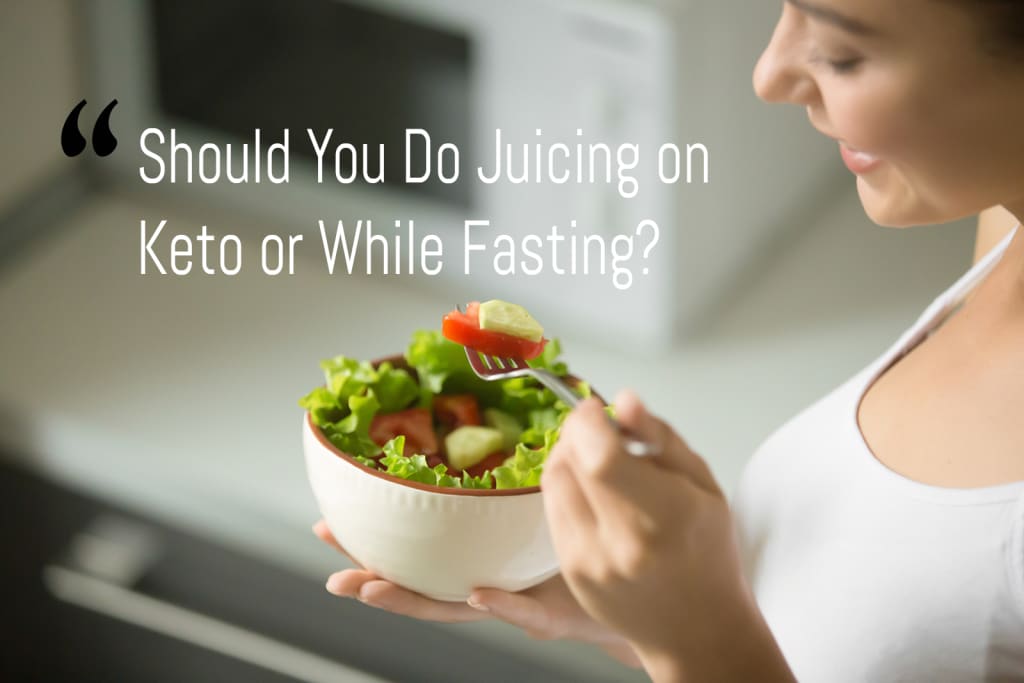Should You Do Juicing on Keto or While Fasting?
A keto tips for weight loss

Juicing has become increasingly popular as a way to consume more nutrients, vitamins, and minerals. However, when it comes to the popular low-carb, high-fat diet known as the ketogenic (keto) diet or fasting, the question arises whether juicing is a compatible addition or not.
In this article, we will explore whether it's okay to juice while following the keto diet or while fasting, and what benefits and drawbacks there may be.
The Keto Diet and Juicing
The ketogenic diet is a high-fat, moderate-protein, low-carbohydrate diet that has been shown to be effective for weight loss and improving various health markers, such as blood sugar and cholesterol levels.
The main idea behind the keto diet is to reduce the intake of carbohydrates to a minimum, so that the body enters a state of ketosis, where it starts to burn fat for fuel instead of carbohydrates.
Juicing, on the other hand, is a way to consume large amounts of fruits and vegetables in a concentrated form. While juicing can be a convenient way to increase the intake of nutrients, it also comes with some drawbacks, such as the loss of fiber and the high sugar content of many fruit juices.
So, can you do juicing while following the keto diet? The answer is yes and no. On the one hand, many vegetable juices are low in carbohydrates and high in nutrients, making them a good choice for the keto diet.
On the other hand, fruit juices are often high in sugar, which can kick you out of ketosis. To make juicing compatible with the keto diet, it's important to choose low-carb, low-sugar juices, such as green juices made from spinach, kale, and other low-carb greens.
Fasting and Juicing
Fasting is a dietary practice that involves abstaining from food for a certain period of time, with the goal of improving health, promoting weight loss, and increasing longevity.
There are many different forms of fasting, such as intermittent fasting, alternate-day fasting, and extended fasting, to name a few.
While juicing can provide the body with a quick boost of nutrients, it can also break a fast, as it technically counts as consuming calories.
The idea behind fasting is to give the digestive system a break and allow the body to focus on repair and rejuvenation. Drinking juice during a fast can interrupt this process and potentially reduce the benefits of fasting.
However, some people choose to do a “juice fast”, where they only consume juice for a certain period of time.
While this can provide the body with a concentrated dose of nutrients, it's important to keep in mind that juice fasting can also be high in sugar and may not provide enough protein and healthy fats to meet the body's needs.
The Bottom Line
In conclusion, juicing can be a great way to increase the intake of nutrients, but it's important to keep in mind the dietary context in which it is consumed. If you're following the keto diet, it's important to choose low-carb, low-sugar juices.
If you're fasting, it's best to avoid juice or opt for a juice fast only after consulting with a healthcare professional. By making informed choices, you can maximize the benefits of both juicing and the keto diet or fasting, and promote optimal health and wellness.
About the Creator
Vivekananthan Vellaichamy
Writing is my passion. I love writing stories about scary things and health related articles. And I love writing movies reviews about ghost and serial killer movies.






Comments
There are no comments for this story
Be the first to respond and start the conversation.